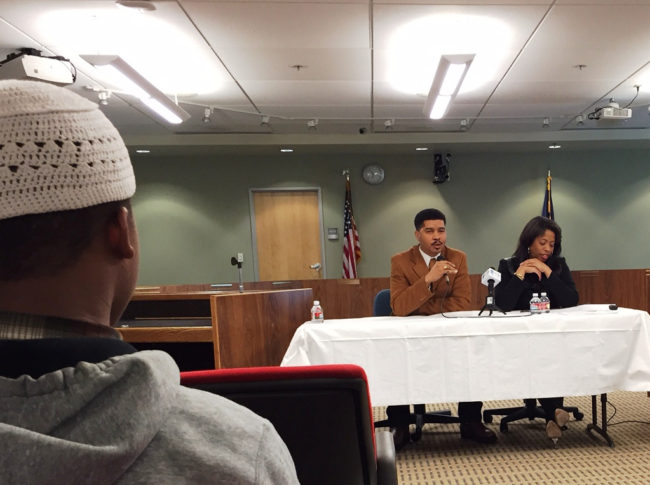
Data from the state’s Department of Education and Early Development show that students of color drop out of high school at higher rates than white students. Anchorage’s chapter of the NAACP is trying to change that. They hosted a community meeting on Wednesday night where a crowd the Anchorage School District Boardroom to start a dialogue about helping young men of color succeed. Community members asked questions of two experts who have led programs to help young black men in the United States.
When the moderator asked what the community should do if they find the district is resistant to change or says there isn’t a problem, a murmur of recognition ran through the crowd. Parent Chrystel Bankhead-Scott nodded, wanting solutions. She says she feels like her son is being tracked and given fewer educational choices, though she says she doesn’t know if it’s linked to race.
“That’s why I’m here today,” she said after the meeting. ”I’m so disappointed. In fact it’s mind blowing. I was shocked about what we were going through.”
Bankhead-Scott says she’s worried that other students are also being impacted.
Dr. Allia Carter is the interim vice president of student affairs at Darton State College in Georgia and was one of the speakers. She says schools are so institutionalized that it’s hard for teachers and administrators to form authentic relationships with the students. She says the solution starts with meeting the kids where they’re at as individuals.
“It’s all really about building that relationship. So the moment you connect with that child and you can truly see that they’re learning and inspired and want to learn, keep that going and stay motivated with that.”
But the solution needs to go beyond traditional teacher-parent-student relationships. Carter says it needs to involve the whole community.
The schools “need to reach out to the advocates for those children. Some times they’re not parents. They might be people who are affiliated with faith-based organizations, their youth organizations, their parks and rec departments. Those kind of people. And I think it’s time for all of us to step up and respond to our community’s needs.”
Community member and parent Adrienne Reed says it’s time to stop talking and start reaching out.
The conversation “needs to go to the junior highs and the high schools. The counselors, the community leaders, go into the classrooms, pull these young men out and ask them, ‘What is the disconnect? Why are you out here doing things that we shouldn’t be doing when you have so many other opportunities? What are we, as adults, as your community doing to fail you?’ Don’t just shove money down their throats, don’t just shove education down their throats. See what it is that they need.”
Reed says she’s ready to start knocking on doors and helping the young men of Anchorage.
